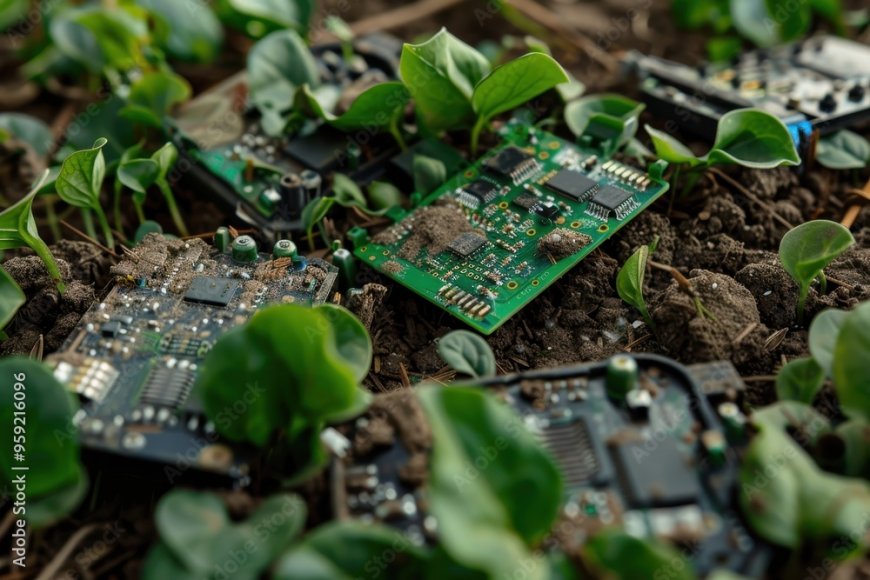Biodegradable Electronics: Paving the Way for a Greener Tech Future
Discover how biodegradable electronics are transforming the tech industry by reducing e-waste and promoting sustainability. Learn about innovations, benefits, and future trends.

The rapid growth of technology has led to an overwhelming amount of electronic waste (e-waste), posing serious environmental hazards. Every year, over 50 million metric tons of e-waste are generated worldwide, with a large portion ending up in landfills, leaking toxic chemicals into the soil and water. As sustainability becomes a global priority, scientists and engineers are now turning to biodegradable electronics—an innovative solution that could revolutionize the tech industry.
These next-generation devices are designed to naturally decompose after their lifespan, reducing the environmental footprint of consumer electronics. But how do they work? What are their benefits and challenges? Let’s explore the future of sustainable technology through biodegradable electronics.
1. What Are Biodegradable Electronics?
Biodegradable electronics, also known as eco-friendly electronics or transient electronics, are electronic devices made from organic, non-toxic, and biodegradable materials that can naturally break down when exposed to environmental conditions like moisture and bacteria. Unlike conventional electronics, which use heavy metals and plastic-based components, these devices rely on biocompatible materials such as:
- Biodegradable polymers (e.g., polylactic acid, silk proteins)
- Dissolvable metals (e.g., magnesium, zinc)
- Organic semiconductors (e.g., carbon-based materials)
- Natural substrates (e.g., cellulose, starch)
Once disposed of, these materials degrade safely, leaving no harmful residues behind—a game-changer in reducing e-waste.
2. How Biodegradable Electronics Are Changing the Tech Industry
A. Reducing Electronic Waste
E-waste is the fastest-growing waste stream globally. Biodegradable electronics offer an alternative that prevents devices from piling up in landfills.
- Example: Researchers have developed biodegradable circuit boards that break down in soil within a few months, eliminating the need for complex recycling processes.
B. Sustainable Medical Devices
Temporary medical implants and wearable devices often lead to bio-waste. Biodegradable electronics allow for safer, dissolvable medical solutions.
- Example: Scientists at Stanford University have created a biodegradable pacemaker that naturally dissolves once its job is done, reducing the need for surgical removal.
C. Green Consumer Electronics
Companies are exploring biodegradable phones, headphones, and batteries, making sustainability a selling point for eco-conscious consumers.
- Example: Researchers are working on a biodegradable smartphone screen that self-repairs and decomposes after years of use.
D. Smart Packaging Solutions
E-commerce and retail industries generate tons of electronic waste from RFID tags, sensors, and packaging trackers. Using biodegradable alternatives helps minimize this impact.
- Example: Companies are integrating biodegradable RFID chips into product packaging, reducing plastic waste in supply chains.
3. Challenges in Biodegradable Electronics
Despite their promise, biodegradable electronics face several hurdles before mainstream adoption:
A. Durability vs. Decomposition
Electronics need to be long-lasting, but biodegradable materials tend to degrade faster than traditional components. Striking a balance between durability and biodegradability is a major challenge.
B. Performance Limitations
Current biodegradable components may not match the speed, efficiency, and power of conventional silicon-based electronics, making them less appealing for high-performance applications.
C. Cost of Production
Developing new biodegradable materials and manufacturing processes requires significant investment, making them more expensive than traditional electronics—at least for now.
D. Lack of Recycling Infrastructure
Most recycling systems are not designed to handle biodegradable electronics, meaning their disposal process needs better regulation and public awareness.
4. Companies and Innovations Leading the Way
Several tech companies, universities, and research institutions are working on making biodegradable electronics a reality:
- Samsung is researching biodegradable phone components to reduce e-waste.
- Xerox PARC has developed disposable electronic circuits that break down after use.
- University of Illinois scientists have created biodegradable transistors for medical and environmental applications.
- HP and IBM are investing in sustainable printing electronics that use organic materials.
As awareness and demand for green technology grow, more corporations will likely follow suit.
5. The Future of Biodegradable Electronics
The next decade will see rapid advancements in biodegradable tech, driven by environmental concerns and strict government regulations on e-waste. We can expect:
✅ Fully biodegradable smartphones and tablets
✅ Eco-friendly batteries with minimal waste
✅ Smart sensors for agriculture that dissolve after use
✅ Wearable tech made from plant-based materials
✅ New policies encouraging sustainable tech production
As research continues, biodegradable electronics could become the standard rather than the exception, helping us transition to a more sustainable and circular economy.
Conclusion: A Sustainable Tech Revolution is Coming
Biodegradable electronics have the potential to reshape the technology industry, offering an eco-friendly alternative to traditional devices. While challenges remain, ongoing innovations in materials and design are bringing us closer to a world where electronics no longer harm the planet.
As consumers and companies demand more sustainable solutions, biodegradable electronics are set to play a key role in the future of green technology. The next step? Scaling up production and making these devices accessible to the masses.
???????? The future of tech isn’t just smart—it’s sustainable.
What's Your Reaction?
 Like
0
Like
0
 Dislike
0
Dislike
0
 Love
0
Love
0
 Funny
0
Funny
0
 Angry
0
Angry
0
 Sad
0
Sad
0
 Wow
0
Wow
0



















































